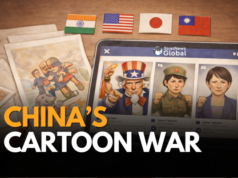Pavithran Rajan is a former army officer-turned tech entrepreneur and academic, who believes there is a reason why China’s AI DeepSeek model was never developed in India.
“There’s no Government of India policy which will back up an Indian product and an Indian product cannot compete with a Western product. When there’s no hand holding there’s no production of that product. The Chinese are wise, they know that without their products under their sovereign control, they cannot be a player.”
Rajan was speaking on the geopolitics of AI on The Gist. He acknowledged that the current government has taken “baby steps”, but they have restricted those baby steps to defence technology, which cannot be seen in isolation to the rest of the tech ecosystem.
China’s DeepSeek AI should be a wake-up call and the government should take a long hard look at the emerging world order to ensure India remains relevant. This would require moving away from the current thinking regarding AI: that India should ride on the backs of foreign tech majors and this flows from the fact that their business comes from there.
Rajan says India needs to “create product companies … you have to build your own deep tech … and for this we need a common venture capital system not this government venture capital system.”
Everywhere he notes, except in Incredible India, hand holding is the norm and it exists in capitalist societies and also in the communist ones. Although the Indian government has said a global venture capital fund will be launched, it’s not clear how it is being structured.
“When I look at our innovation ecosystem, I see signs of a licence model of ecosystem which is being created,” he said, “this will not test innovation or foster agility.”
Rajan has a model that he and others have worked on, which brings together India’s talent and immense potential with ideas that have worked in other parts of the world. But India has to always be alive to the fact that other parts of the world will watch this country’s rise warily.
“India is a large nation, it dominates the Indian Ocean, maritime trade routes, is a neighbour of China and strategically and geopolitically a state which can alter the global order.”
That last is something none of today’s big geopolitical players want.
Thirty eight years in journalism, widely travelled, history buff with a preference for Old Monk Rum. Current interest/focus spans China, Technology and Trade. Recent reads: Steven Colls Directorate S and Alexander Frater's Chasing the Monsoon. Netflix/Prime video junkie. Loves animal videos on Facebook. Reluctant tweeter.




